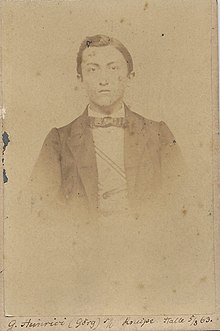Carl Friedrich Georg Heinrici (14 March 1844– 29 September 1915) was a German Lutheran theologian best known for his studies involving the relationship of early Christianity with its Greek environment.
Georg Heinrici | |
|---|---|
 | |
| Born | 14 March 1844 |
| Died | 29 September 1915 (aged 71) |
| Other names | Heinrici, Carl Friedrich Georg |
| Occupation | Lutheran theologian |
| Relatives | Gotthard Heinrici (cousin) Gerd von Rundstedt (cousin) |
Biography
editFrom 1862 to 1867 he studied theology and philosophy at the universities of Halle-Wittenberg and Berlin. In 1873 he became an associate professor of New Testament exegesis at the University of Marburg, where during the following year, he attained a full professorship. In 1892 he succeeded Theodor Zahn as professor of New Testament exegesis at the University of Leipzig, where in 1911/12 he served as rector. From 1892 to 1914 he was director of the Neutestamentarisch-exegetischen Seminar at Leipzig.[1][2]
Selected works
edit- Die Valentinianische Gnosis und die heilige Schrift; eine Studie, 1871 – Valentinian gnosis and the Holy Scriptures.
- Das erste Sendschreiben das Apostel Paulus an die Korinthier, 1880 – The first epistle of Saint Paul to the Corinthians.
- Das zweite Sendschreiben des Apostel Paulus an die Korinthier, 1887 – The second epistle of Saint Paul to the Corinthians.
- Theologische encyklopädie, 1893 – Theological encyclopedia.
- Das Urchristentum, 1902 – Early Christianity.
- Die Bergpredigt (Matth. 5-7. Luk. 6, 20-49) Begriffsgeschichtlich untersucht, 1905 – The Sermon on the Mount, a conceptual history.
- Hellenismus und Christentum, 1909 – Hellenism and Christianity.
- Die Eigenart des Christentums, 1911 – The uniqueness of Christianity.
- Die Hermes-mystik und das Neue Testament, 1918 – Hermeticism and the New Testament.[3]
References
edit- ^ Professorenkatalog der Universität Leipzig Biographical sketch
- ^ Heinrici, Georg Deutsche Biographie
- ^ HathiTrust Digital Library published works